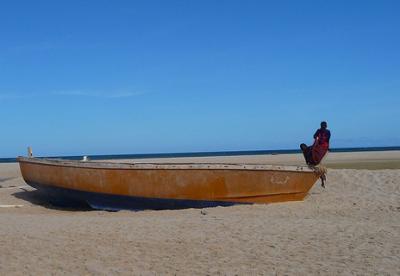
November 2012
Thanks to increased international naval presence and the placing of armed guards aboard merchant vessels, the Indian Ocean has seen a recent decline in piracy. However, in reality, this decline is merely a decline in the symptoms of a much deeper problem.
In the early 1990’s, Somalia was torn apart by a civil war that wound up lasting for decades. The absence of an acting central government brought a brutal struggle for power, and law enforcement became virtually nonexistent. This became a problem for those that lived on the coast of Somalia and supported themselves by fishing the vast fish stores in their waters. Because there was no government to protect the shores, many foreign fishing vessels began to illegally raid Somali fish stocks. In addition to the fishing, many international corporations used Somali waters as a dumping ground for toxic chemicals.
Local Somali fishermen eventually decided to take matters into their own hands. They formed violent gangs of seafarers, attempting to act as informal coastguards. Violent clashes with these foreign vessels ensued. Eventually these illegal fishermen became much better armed than the Somalis, causing these gangs to go after any vessel in Somali waters that was easy to attack, whether fishing or merchant.
The Somalis began to extort what they thought of as taxes or fines from these ships travelling through their waters. Because the ships eager to pay to avoid violence, it fueled this developing market for piracy and attracted others to this increasingly profitable trade. Soon, Somalis began to ransom hostages taken from these boats, which increased their payments and further attracted poor young men of the war-torn and unstable country.
As foreign war ships began to appear in 2009 and the international counter-piracy movement gained momentum, many within Somalia began to question this violent practice. In their argument, pirates resorted to nationalist rhetoric, justifying their actions by pointing out that despite the recent international “enforcement”, illegal fishing and dumping off their coast did not cease.
This point can be seen in the fact that many pirate action groups are named as things such as the “National Volunteer Coastguard”. Many pirates insist that they are merely enforcing their own waters and taking a transit tax like any other sovereign nation would. As pirate gangs became more influential, they gained a foothold in the on-land Somali political and social networks, becoming a permanent facet of the war-torn country’s political landscape.
In a recent chapter of the civil war, pirate gangs have even been contracted as mercenary participants, with some of them convinced to help a large coalition battle the radical Islamic group al-Shabaab.
The effect of the counter-piracy efforts of international navies was profound on the pirate scene. The influx of cash from huge ransoms the pirates collected cause hyperinflation among the coastal communities, making the fishing industry nearly completely worthless. This drove even more to piracy, however, now there was less success to be had because of the increased protection of merchant vessels.
By this time, though, the most successful pirates had professionalized their operations, and thanks to their previous ransom money, were able to financially absorb the losses incurred when their raiding parties were captured or killed by vessels from the numerous international coalitions now patrolling the Indian Ocean. But this also meant that poor, young fishermen could not simply get into piracy for themselves with their single skiff and meager weapons. Now, entry-level pirates had to join these increasingly large pirate organizations and start out at the bottom. This allowed so-called “pirate kings” to increase the quantity of their missions, hoping to simply get lucky by playing the numbers, thanks to the new influx of disposable human capital.
Eventually, Somali communities began to strengthen their reaction against piracy. The illegal trade brought with it much more illicit activity, including drugs, prostitution and violence. The new piracy-driven economy was completely unstable, and regular people were negatively impacted by inflation.
Religious leaders and community elders began to speak out against piracy, attempting to get many pirates of all levels to quit the game, and discouraging more youth from joining the gangs. Parents began banning their children from marrying or interacting with pirates, and businessmen stopped their financial interactions with them. Pirates began to be chased away from local communities when they would attempt to dock a hijacked ship there. Fortunately, pirates usually left with little-to-no violence against their Somali brethren.
Finally, some of the regions of Somalia have become semi-autonomous due to the nonexistence of a central government for over two decades. Puntland is the foremost example. This regional government has established the Puntland Maritime Police Force (PMPF), which has been successful in combating piracy networks on-land. This force itself is worrisome to the United Nations, who has expressed concern over the lack of accountability to the central government. They fear that the PMPF could be used to further the political agenda of the ruling authorities in Puntland and thus disturb the fragile security situation in Somalia.
Despite the success of the numerous responses to the problem of piracy, the only true solution to the problem will be to help Somalia get back on its feet. It is not simply an issue of destroying, disrupting or deterring the already established pirate networks. Steps must be taken so that piracy is no longer a viable or necessary option for those struggling to survive. With a strengthened central government, Somalia will not only be able to combat piracy itself, but will also be able to represent to country’s overall interests to the international community. Only a strong Somali government will be able to rid their waters of the ultimate cause of piracy, illegal fishing and dumping. With the return of a vibrant fishing industry, coastal Somalis will not need to resort to piracy. Let the international military coalitions work to help Somalia stabilize internally on land– spending billions on military vessels to combat small pirate skiffs is a waste of resources and a short-term solution only.